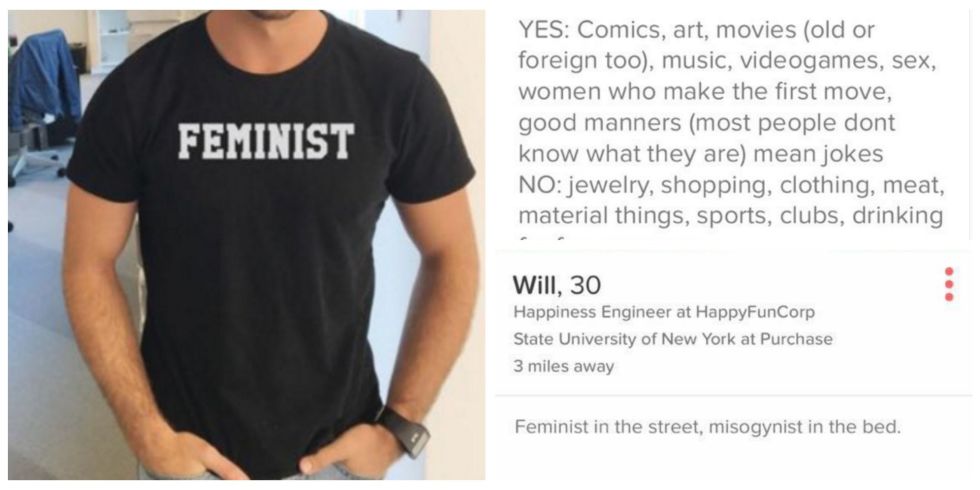Recently, I ran into an Asshole At A Dinner Party (TM) who had, amongst other things,
opinions about feminism and misogyny. Namely, he didn't think that misogyny was a real problem in the Western world because "he'd never seen evidence of it himself". Bear in mind that this dude didn't actually seem to
mean to be an asshole. He was just being deliberately ignorant — and white, and straight, and well-educated, and basically in a position to educate himself as much as he chose about any given issue.
I am a strong proponent of getting into arguments with these people, and giving them rational, reasoned evidence and good arguments as to why their perspective needs to change. Statistics can only do so much; studies have shown that
anecdotal evidence is just as, if not more, powerful in influencing peoples' opinions as rational evidence. So, if I'd met that dude over again, I'd have thrown in my own experiences and those of my friends: discovering they made less than the man who did their same job, being sexually assaulted and then mistreated by the police, being constantly pressured to have babies, being felt up or poked on public transport and harassed by strangers, experiencing surprised customers who couldn't believe they were a "girl" and so good at their job. All those stories are true. And I wish I'd marshalled them in time.
So next time you meet an Asshole At A Dinner Party with opinions on feminism, here's a good way to school them. With a healthy dose of input from your own experiences and those of your friends, of course.
1. "I've Never Seen Misogyny, So I Don't Think It's A Problem"
How nice for you, sunshine! It must be lovely to live in a bubble. Let me tell you some things that may transform your idea that it's not a real problem in the Western world (which I imagine is what you mean). In 2014, women in full-time employment in America were paid, on average,
79 percent of the income paid to men. That's despite huge rises in women's education. And it seems, according to reporting in November 2015, that it will
take over 100 years for women to be paid the same amount for the same work. This reflects
sexism in hiring practices, inequality in maternity and paternity leave, glass ceilings, hostile work environments, women's cultural expectation not to fight for pay rises, occupational segregation, and women's work being undervalued, among other things.
2. "Feminists Should Be Equalists"
I've
discussed this in detail for Bustle before, so really I should just give you a hand-out of my article and tell you to come back when you've read it. But here's a summary: feminism is based on altering the historical, endemic discrimination against women across all quarters of society, from economic to medical to educational to sexual. It believes men and women should be equal and have equal rights, and that fighting against sexist attitudes and restrictions is necessary to make this happen. We are believers in equality, but we're also realists about the world, and how far behind women have been and continue to be.
And no, we shouldn't be humanists either. Humanism is an entirely different philosophical position that focused on rational, scientific thought. Don't mix up your words.
3. "Men Have Rights And Problems Too"
Of course they do! Patriarchy has bad effects on men all around the world. It keeps them from expressing their emotions, traps them in gender roles they may not want, and causes damage all over the place. Feminism isn't about minimizing men's problems or saying they have everything the way they want it. It's possible to focus on the difficulties (which are many and long-standing) of one gender without pretending that the other one is hunky-dory all the time.
Feminism benefits men.
4. "There Are Just Natural Differences Between Men And Women"
Indeed there are. But difference does not mean incapability, which is the big issue here.
5. "There Are Much Bigger Issues In The World Today Than Women's Rights"
OK, then. Tell me another measure by which we could
boost the world economy by $28 trillion every year. That's the approximate cost of gender inequality worldwide; if women were given equal education and opportunity, equal pay and full participation in the workforce, they'd boost global wealth by a phenomenal amount.
Also, it's entirely possible to be a feminist and also advocate for refugee rights, an end to racism, equality for the disabled, nuclear disarmament, and whatever else. But feminism highlights a serious and very important issue, and insofar as ranking causes go (whatever good that will do), I think it lodges itself pretty high.
6. "You Must Hate All Men"
Yes, all feminists want to lock men in basements and make them do their bidding. That's why the straight and bisexuals amongst us marry men, date men, have children with men, and regularly spend a lot of our time with dudes. Feminists are perfectly capable of liking men (particularly men who love gender equality! Go those dudes!) and also condemning the world's gender oppression and silly gender stereotypes. We want to be equal, not to have nobody to talk to at brunch.
7. "Feminists Want Women To Have More Power Than Men"
Incorrect. The playing field is not level, even if your limited experience dictates that it is; see all the previous examples given about wage inequality, for example. Feminists genuinely do just want women to be given the same opportunities and rewards as men. It seems relatively simple, but you'd be really surprised how many people fight against it or see it as threatening their vested interests. We're not trying to cheat anybody out of anything, we promise!









